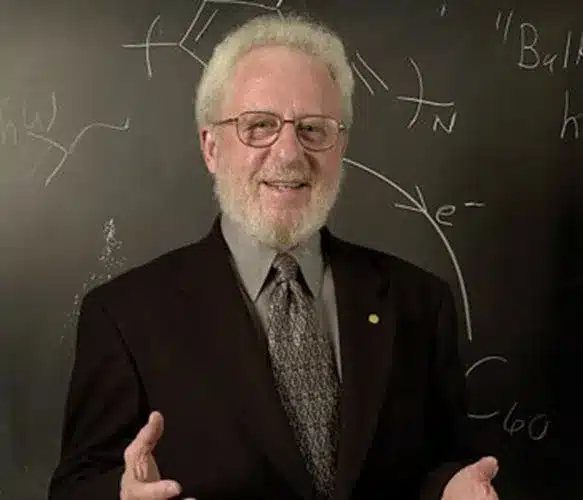Alan Jay Heeger: Nobel Laureate in Chemistry and Pioneer in Conductive Polymers

Alan Jay Heeger (born 22 January 1936) is an American physicist, and academic. He received the Nobel Prize in chemistry.
Life and Career
He was born on 22 January 1936, in Sioux City, Iowa, United States. In 1957, he earned a B.S. in physics and mathematics from the University of Nebraska-Lincoln, and in 1961, a Ph.D. in physics from the University of California, Berkeley. He was a professor at the University of Pennsylvania from 1962 to 1982. In 1982, he started teaching in Physics and Materials Departments at UC Santa Barbara. Many start-up companies have been formed based on his research, like Uniax, Konarka, and Sirigen, which was founded in 2003 by Guillermo C. Bazan, Patrick J. Dietzen, and Brent S. Gaylord.
In 1990, Heeger founded UNIAX Corporation to develop and manufacture light-emitting displays using conducting polymers; in 2000, UNIAX was bought by DuPont. In 2001 he co-founded Konarka Technologies, which makes thin, flexible solar cells out of plastic.
He participated in a Brown-Bag Lunch with a Laureate at the USA Science and Engineering Festival in October 2010, where students talked to Nobel Prize-winning scientists. He is also on the Advisory Board of the USA Science and Engineering Festival. He’s judged the STAGE International Script Competition three times (2006, 2007, 2010).
Research
His primary research is on semiconductors and metallic polymers. His biggest contribution was discovering that certain plastics conduct electricity in 1977. In his lab, they study light-emitting diodes (LEDs), light-emitting electrochemical cells (LECs), and lasers made of semiconducting polymers and work on issues related to the fundamental electronic structure of these new materials.
He’s studying semiconducting polymers and how they emit light.
Heeger, MacDiarmid, and Shirakawa studied polyacetylene, a polymer that existed as a black powder. In 1977, the three men examined polyacetylene by exposing it to iodine vapor at the University of Pennsylvania. They introduced impurities into the polymer like semiconductors are doped to tailor their conductive properties. As a result of the discovery, scientists discovered other conductive polymers and molecular electronics started to take off.
Award and Legacy
He won the Nobel Prize for Chemistry in 2000 for discovering that certain plastics can conduct electricity almost as well as metals.
Observer Voice is the one stop site for National, International news, Sports, Editor’s Choice, Art/culture contents, Quotes and much more. We also cover historical contents. Historical contents includes World History, Indian History, and what happened today. The website also covers Entertainment across the India and World.

